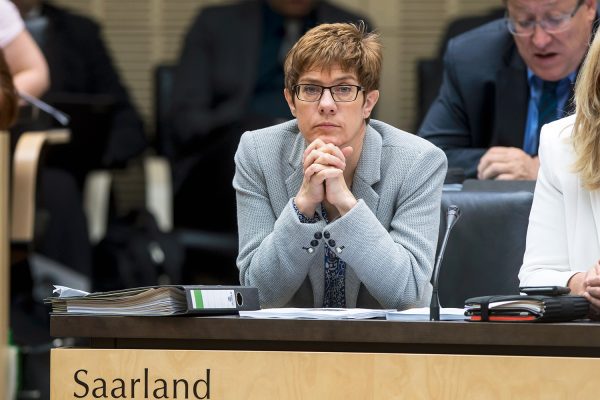
Angela Merkel’s heir apparent, Annegret Kramp-Karrenbauer, has unexpectedly quit, throwing the race to succeed the German chancellor wide open.
Kramp-Karrenbauer is stepping down as leader of the ruling Christian Democratic Union (CDU), a position she has held since 2018. She will remain as defense minister.
Merkel elevated Kramp-Karrenbauer from the prime ministership of Saarland, on the border with France, to national politics in order to prepare her for a run in 2021. Although Kramp-Karrenbauer is socially more conservative than Merkel (she opposed marriage equality), she was seen as likely to defend the chancellor’s centrist legacy.
Merkel has said she will not serve a fifth term.
Candidates
Kramp-Karrenbauer’s resignation gives Jens Spahn and Friedrich Merz another shot at the top job. Both ran in 2018. The leaders of North Rhine-Westphalia and Bavaria could also compete.
- Armin Laschet, prime minister of North Rhine-Westphalia, Germany’s most populous state, notably called for closer EU integration during the Greek debt crisis, when Merkel took a hard line.
- Friedrich Merz, a former CDU parliamentary group leader and longtime rival to Merkel, appeals to traditionalists. He got 40 percent support on the first ballot in 2018 and 48 percent in the runoff against Kramp-Karrenbauer.
- Markus Söder, the Bavarian prime minister and leader of the CDU’s sister party, the Christian Social Union. It opposed Merkel’s open-doors immigration policy in 2015-16 and moved to the right in an attempt to outflank the far-right Alternative for Germany.
- Jens Spahn, health minister, led the internal opposition to Merkel’s immigration policy. But he is also seen as too young, too inexperienced and too eager. He got just 16 percent support on the first ballot in 2018.
A leadership election is expected to be held this summer. Kramp-Karrenbauer will remain head of the party until then.
Authority
Kramp-Karrenbauer never approached Merkel’s popularity in the polls, nor her authority in the party.
This became painfully obvious last week, when the Christian Democrats in Thuringia defied Kramp-Karrenbauer’s instructions and joined the far-right Alternative in voting in a liberal state premier, Thomas Kemmerich. Only when Merkel intervened did Kemmerich step down and call early elections.
Kramp-Karrenbauer provoked a backlash last year when she opened the door to Internet regulation. She never made any concrete proposals but was immediately accused of advocating censorship.
A joke she made about gender-neutral bathrooms in 2019 was similarly blown out of proportion by the left, which is desperate to return to power after fifteen years of CDU rule. The share of Germans who called Kramp-Karrenbauer unfit to be chancellor topped 50 percent in the polls.
